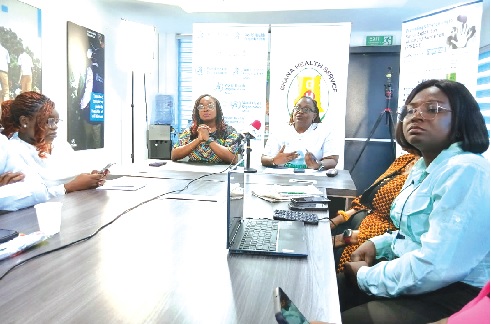
About 2.5 million girls aged nine to 14 years have been targeted for a five-day nationwide Human Papillomavirus (HPV) vaccination campaign that starts on October 7.
The vaccination, which is aimed at offering protection for girls against cervical cancer, forms part of plans by the Ghana Health Service (GHS) to introduce HPV vaccine into the routine immunisation schedule of the country after the campaign, making Ghana one of the 28 countries on the continent to have it on their routine immunisation.
By adding HPV vaccine into routine immunisation, it means that after the campaign, parents and guardians can take their girls who are eligible to be vaccinated to any Child Welfare Clinic, otherwise known as weighing, to be vaccinated against the virus which is known to be the primary cause of cervical cancer.
The Programme Manager of the Expanded Programme on Immunisation, Dr Selorm Kutsoati, announced this at a media sensitisation on the introduction of HPV vaccine in Ghana. It was jointly organised by the GHS and the World Health Organisation (WHO) in Accra yesterday.
She explained that the service would use all its approaches for immunisation in the campaign, including outreaches, static site which was vaccination at GHS health facilities, health personnel going round schools to vaccinate the girls as well as camp-out for hard to reach areas such as island communities.
For girls who might miss out during the campaign period, she said the service would do a catch-up for them for a period.
For out-of-school girls, she said the service had already identified the areas where they would find them and would, therefore, go there during the campaign to get them immunised based on their age.
She said the girls would be administered with a single dose of Gardasil 4, which she explained was effective in providing protection against high risk HPV 16 and 18 as well as tackling genital warts.
For the routine immunisation, she said the service was targeting 440,000 girls for vaccination, and this would be for girls who were only nine years old.
HPV infections
HPV Infections are the most common sexually transmitted infections (STIs) and are often passed from one person to another, commonly during sexual activity and other skin to skin contact.
The risk factors for HPV infection include early initiation of sexual activity and sex with multiple partners.
It is, therefore, important for girls to get vaccinated before their first sexual encounter.
HPV vaccine is an effective measure to prevent persistent HPV infection and its related health outcomes, particularly cervical cancer among women.
Cervical cancer is the second leading cause of cancer and cancer related deaths among women in Ghana.
With around 3,000 new cases and 2,000 deaths recorded annually, the burden of the disease is quite significant.
This calls for maximum support for the HPV vaccine into routine immunisation to protect all eligible girls against HPV.
Single dose
Dr Kutsoati explained that a single dose strategy was being used in the campaign as against two or three doses used during the pilot of the vaccine in the country 10 years ago.
This, she explained, was because studies undertaken over the years had revealed that single dose vaccine was enough to provide protection for girls against cervical cancer.
She said it was very feasible for the country to eliminate cervical cancer using HPV Vaccine, however, if the disease was left to go the way it was currently occuring in the country, then the country risked having significant increases.
Safety
Touching on the safety of the vaccine, the WHO Country representative to Ghana, Dr Fiona Braka, said the HPV vaccine had been in use since 2006, with 140 countries around the world currently using it, including 28 countries in Africa.
In Ghana, she said a pilot of the vaccine was undertaken from 2013 to 2015 to assess its safety and effectiveness, and it confirmed the vaccine’s safety and effectiveness, which was in alignment with a number of studies that had been done in other settings to assess the same profile.



